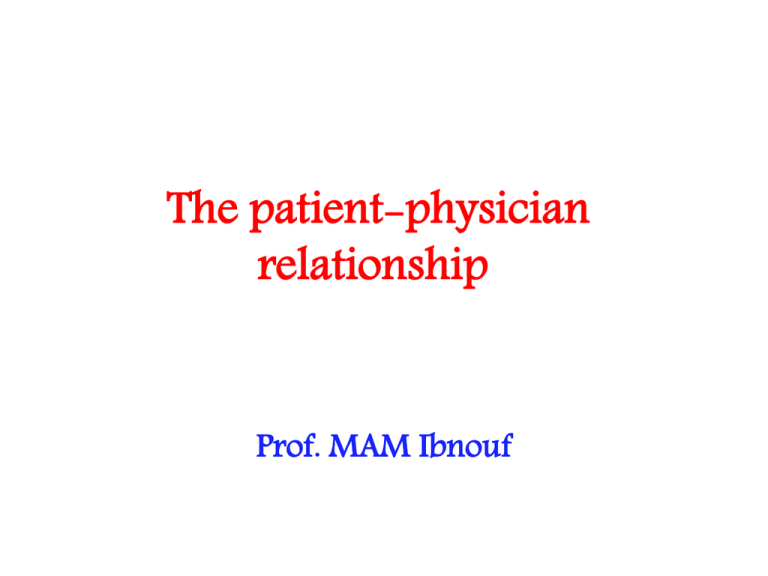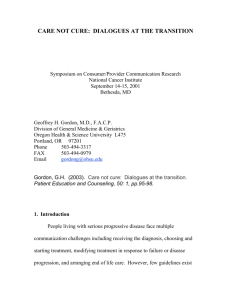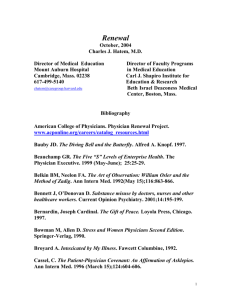7- The patient-physician relationship
advertisement

The patient-physician relationship Prof. MAM Ibnouf The patient-physician relationship Built on: 1- Trust 2- Honesty and openness in the relationship, and its therapeutic implications for patients. 3- Ensuring continuity over time 4- Physicians must also be committed to maintaining appropriate relationships, given the power imbalance between physicians and patients and the inherent vulnerability illness can bring to individuals. Dependence on the Dr. Although physicians have obligations to patients from the outset, those obligations become even stronger over time as the patient comes to depend on the physician. That is particularly true if dissolving the relationship would harm the patient.[1] 1- Austad CS. The forum. Ethics & Behavior. 1992;2(3):215-226. Dr. withdrawal • In ethics and the law, a physician may not abandon a patient[1]. Abandonment has been defined as the physician's unilateral withdrawal from the relationship without formal transfer of care to another qualified physician.[2] 1- American College of Physicians. Ethics Manual. Fifth edition. Ann Intern Med. 2005;142:560-582 2- Pellegrino ED. Nonabandonment: an old obligation revisited. Ann Intern Med. 1995;122:377-378. Limits of relation The ethical obligation of the physician to maintain a relationship with a patient is not without limits. [1] Experts have argued that a physician may refuse to continue caring for a patient when, for example, continuing that relationship may harm other patients or the physician, as in the case of a patient who threatens physical violence. [2] Likewise, a physician is not required "to violate fundamental personal values, standards of medical care or ethical practice, or the law[3]" in providing patient care. 1- Thieman S. Avoiding the claim of patient abandonment. Missouri Med. 1996;93:634-635. 2- Gordon HL, Reiser SJ. Do physicians have a duty to treat Medicare patients? Arch Intern Med. 1993;153:563-565 3- American College of Physicians. Ethics Manual. Fifth edition. Ann Intern Med. 2005;142:560-582. Justifiable without harm A physician may discharge a patient from the practice after concerted attempts to resolve the matter have failed, if adequate replacement care is available and the patient's health is not jeopardized in the process. But the physician must ensure that the reasons for discharging a patient are justifiable and ethical.[1,2,3,4] 1- American College of Physicians. Ethics Manual. Fifth edition. Ann Intern Med. 2005;142:560-582 2- Austad CS. The forum. Ethics & Behavior. 1992;2(3):215-226. 3- Gordon HL, Reiser SJ. Do physicians have a duty to treat Medicare patients? Arch Intern Med. 1993;153:563-565. 4- Tapper CM. Unilateral termination of treatment by a psychiatrist. Can J Psychiatry. 1994;39:2-3 Discrimination • An ethical and legal matter, physicians must make sure that discrimination plays no part in any patient discharge decision. A doctor may not discriminate against a class or category of patients. [1] The Disabilities Act prohibits physicians from refusing to care for disabled patients. A number of cases have arisen, for example, involving physicians who have refused to care for HIV positive patients.[2,3] 1- American College of Physicians. Ethics Manual. Fifth edition. Ann Intern Med. 2005;142:560-582. 2- Smolkin, D. HIV infection, risk taking, and the duty to treat. J Medicine Philosophy. 1997;22:75-88. 3- Daley J, Forrow L. Ethical issues. Primary Care. 1992;19:203-216 • Economical reasons Discharging a patient because of economic concerns or reimbursement levels is ethically objectionable. Pt wishes Both the patient and physician should discuss their concerns and expectations for ongoing care. The physician should try to understand the patient's wishes and beliefs, make a serious attempt to resolve differences, and document all these efforts before considering discharge and transfer of the patient's care.[1] • American College of Physicians. Ethics Manual. Fifth edition. Ann Intern Med. . 2005;142:560-582 Documentation • Letter should be sent via certified mail return receipt requested, to the second physician[1] and discharging physician should have a conversation with the patient about the end of their relationship. He should ensure that patient’s medical records are released to his new physician in a timely manner. If the ending of the patient-physician relationship is necessary, by adhering to these standards, The discharging physician can ensure that the transition the patient medical care to another physician is as smooth as possible and that he is conforming to the ethical principles of nonmaleficence, the duty to do no harm, the physician's obligation to promote the good of the patient and to act in the patient's best interests. • Santalucia C, Michota FA. When and how is it appropriate to terminate the physicianpatient relationship? Cleveland Clin J Med. 2004;71:179-183.








